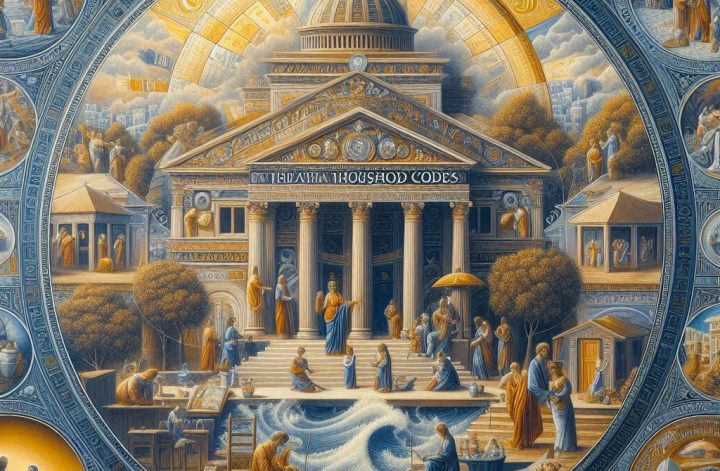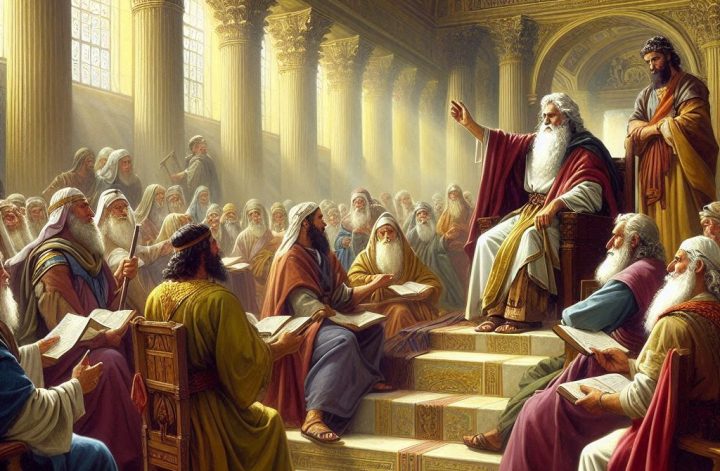I understand that this can become a charged issue for many Christians and that various Christian traditions over the ages have taught that Jesus’s death by itself was sufficient for atonement. Indeed, I believed similarly until I came across a scholarly work by David Moffitt. When we interact with various biblical data points, we will see that the Bible says something different about our topic. The belief that Jesus’ death was all needed for atonement has much biblical data for it. Here are a few:
John 1:29 ESV
The next day he saw Jesus coming toward him, and said, “Behold, the Lamb of God, who takes away the sin of the world!
The idea here is that of the sacrificial lamb in Jewish temple rituals. Of course, John would further clarify that this lamb was slain in Revelation 5:6. Together, the verses imply that the slaying of the Lamb equals the taking away of sins.
Colossians 2:13-15 ESV
[13] And you, who were dead in your trespasses and the uncircumcision of your flesh, God made alive together with him, having forgiven us all our trespasses, [14] by canceling the record of debt that stood against us with its legal demands. This he set aside, nailing it to the cross. [15] He disarmed the rulers and authorities and put them to open shame, by triumphing over them in him.
Paul says the “record of debt” opposing the Colossians before God was canceled by nailing it to the cross. The idea is substitutionary. God took care of sins by the cross.
Romans 5:6, 8 ESV
[6] For while we were still weak, at the right time Christ died for the ungodly.
[8] but God shows his love for us in that while we were still sinners, Christ died for us.
Again, Paul reiterates the same message that Jesus’ death has much to do with addressing humanity’s status as “sinners.”
There are other examples one could point to in defence of the traditional understanding that the death of Jesus by itself takes care of the human sin problem. However, a few other passages provide more details that must be accounted for along with the verses above. Consider the following:
1 Corinthians 15:16-17 ESV
[16] For if the dead are not raised, not even Christ has been raised. [17] And if Christ has not been raised, your faith is futile and you are still in your sins.
This is a fantastic passage that is often overlooked. 1 Corinthians 15 is believed to be the earliest piece of Christian writing – before Matthew, Mark, Luke, and John. Paul here defends the resurrection of Jesus and tells his audience, if they were in doubt, to investigate the over 500 people still alive then and who saw the risen Jesus. In the quoted verses above, Paul says the Corinthians (and all of us) are still in our sins and retain the “sinners” status if Jesus did not resurrect. Contrasted with the traditional understanding of atonement, this is a staggering claim. If Jesus did not rise from the dead, then he remains forever dead. But if the death of Jesus per se was sufficient for atonement, then the resurrection should not matter. In other words, we should not remain in our sins if Jesus did not rise! Yet, the same Paul who makes the statements to the Colossians and the Romans now tells the Corinthians that there is more to the story.
Furthermore, Paul is not alone on this point. Indeed, one of the central themes of the book of Hebrews has to do with this subject. Consider the following:
Hebrews 7:25 ESV
Consequently, he is able to save to the uttermost those who draw near to God through him, since he always lives to make intercession for them.
This text says the resurrected Jesus lives to intercede for believers to save them “to the uttermost” or completely. Again, if his death took care of sin, why did he rise only to continuously make intercession for the people who already believed? The implication is that, contrary to a popular claim, the death of Jesus does not cover all sins – past, present, and future.
The penetrating insight Moffitt, a specialist in the book of Hebrews, offers is that we should understand Jesus’s sacrifice in light of the Old Testament’s sacrificial system. When we do, we realize that atonement sacrifices in ancient Judaism were not an event but a process. When a sinner approached the temple for propitiation, he came with an animal (a bull is required for the sin offering, a ram for a burnt offering, and two additional goats for Yom Kippur. See Leviticus 4 and 16). The sinner seeking to be cleansed then lays his hands on the head of the animal in a substitutionary move; his sins are transferred to the animal. Then, the animal is killed in the courtyard/entrance to the tent of the meeting. Here is an important point: the sinner is NOT yet cleansed because the animal was killed. There are yet more critical steps in the process.
The instructions differ a bit depending on whether the sinner is a priest, an ordinary Israelite, or an elder. But they invariably involve bringing some of the blood of the slain animal inside the Tent of Meeting. The priest would sprinkle some of the blood on the altar and pour the rest at the base of the burnt offering altar. The animal’s fat will be removed and burnt on the altar of the burnt offering. Then, the remaining parts of the slain animal – the head, legs, entrails, and dung – will be carried outside the camp to be burnt on a fire of wood. Only after the process is complete is a sinner assured of forgiveness.
Remarkably, the author of Hebrews sees the sacrifice of Jesus in the same way and declares the sacrificial system of Judaism as “copies of the true things” (9:24). Here is a relevant quote:
Hebrews 9:11-12 ESV
[11] But when Christ appeared as a high priest of the good things that have come, then through the greater and more perfect tent (not made with hands, that is, not of this creation) [12] he entered once for all into the holy places, not by means of the blood of goats and calves but by means of his own blood, thus securing an eternal redemption.
Jesus entered the holy places not in his death but through the ascension that followed his resurrection. This is why the resurrection is essential. If Jesus remained dead, he would have failed to complete the atonement process. This is not to trivialize his death – after all, there can be no resurrection without his death. So, all the New Testament passages suggesting that Jesus’s death achieved atonement took the resurrection (and ascension) for granted. The authors were aware of the process but focused on portions of the process as they saw fit. But when a church like the Corinthians started twisting truths, Paul had to set them straight by emphasizing the criticality of the resurrection in the atonement process.
Here is the key takeaway: Whereas the death of Jesus is by itself insufficient for atonement, Jesus is! The cross is vital, but it is not all there is. We don’t fix our gaze on the cross. We fix our gaze on the one who was on the cross and rose again!
Referenced Work
Moffitt, David M. Rethinking Atonement: New Perspectives on Jesus’s Death, Resurrection, and Ascension. Baker Academic, 2022.










